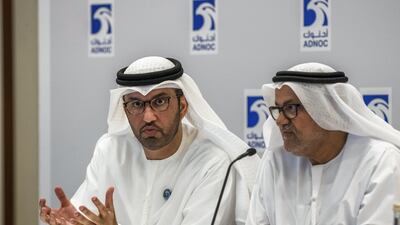Abu Dhabi National Oil Company is offering six oil and gas concessions in the emirate that contain substantial amounts of hydrocarbons for bidding, the first time ever major onshore and offshore blocks to be offered in a competitive round.
“The launch of these large new licensing blocks is an important step for Abu Dhabi and Adnoc as we develop and apply new strategies to realise the full potential of our resources, maximise value through competitive bidding and accelerate the exploration and development of new commercial opportunities,” Dr Sultan Al Jaber, UAE Minister of State and Adnoc Group chief executive officer, said on Tuesday.
The successful bidders will enter into agreements, granting them exploration rights and could be invited to develop and produce any discoveries with Adnoc, the state-owned company said. Blocks on offer in the emirates, which is home to about 6 per cent of the world's proven oil reserves, contain multiple billion barrels of oil and multiple trillion cubic feet of natural gas, it said.
The international technical and commercial road show for the bidding round begins April 23 and will travel to cities in North America, Asia and Europe. Bids are due by October and the first bidding round is expected to conclude this year.
Four of the blocks open for bidding are onshore and the remaining offshore. They span a combined area of 30,000 square kilometres, with each block ranging between 2,500 square kilometres to 6,300 square kilometres in size.
_________
Read More:
Adnoc confirms increased focus on downstream industry
Adnoc takes the 10-year view on LPG exports
_________
The bid round is the first-ever for Adnoc, which previously selected companies without a competitive process.
The new form of the licensing comes as Abu Dhabi state-owned companies seek greater efficiency and maximise profitability in the wake of a three-year oil price slump that began in 2014.
The new bid round is part of Adnoc's transformation efforts, which will garner interest from international oil companies, said Iman Nasseri, acting managing director - Middle East at London-based Facts Global Energy.
"I am sure the political stability as well as fairness in financial arrangements will encourage them [IOCs] to continue their interest in the UAE," said Mr Nasseri. "This whole restructuring that is happening is to make them [Adnoc] more like an international oil company than an national oil company."
Since taking the helm in 2016, Dr Al Jaber has streamlined operations at Adnoc, the UAE’s largest oil and gas company. As part of the reorganisation measures, the company in December sold to the public a 10 per cent stake in its subsidiary Adnoc Distribution, the fuel retailer and convenience store operator, and listed its shares on Abu Dhabi Securities Exchange.
Adnoc currently produces about 3 million barrels of oil a day and 9.8 billion cubic feet of raw gas per day. Nearly 96 per cent of the UAE's reserves are located in Abu Dhabi.
The company remains committed to bolstering its downstream, or refining, capabilities as well as its upstream, or production, business, Dr Al Jaber said.
Abu Dhabi aims to double its domestic output of petrochemicals by two-and-a-half times to 11.5 million tonnes a year by 2025 as part of the emirate’s plan to diversify its sources of income under its 2030 growth strategy. The emirate also plans to increase its portfolio of petrochemical assets globally.
At the centre of Adnoc’s downstream strategy is the construction of what is intended to be the world’s largest integrated refining and chemical site in the world. The planned complex in Ruwais, will produce 14.4 million tonnes of petrochemical products annually by 2025.
“The approach is central to our expanded partnership strategy, which aims to introduce new opportunities as we broaden and diversify our partnership base,” Dr Al Jaber said.
“In addition, as we begin to expand our downstream portfolio, the new licensing blocks reinforce our long term production growth ambitions and builds on our successful legacy as a leading upstream player. “

